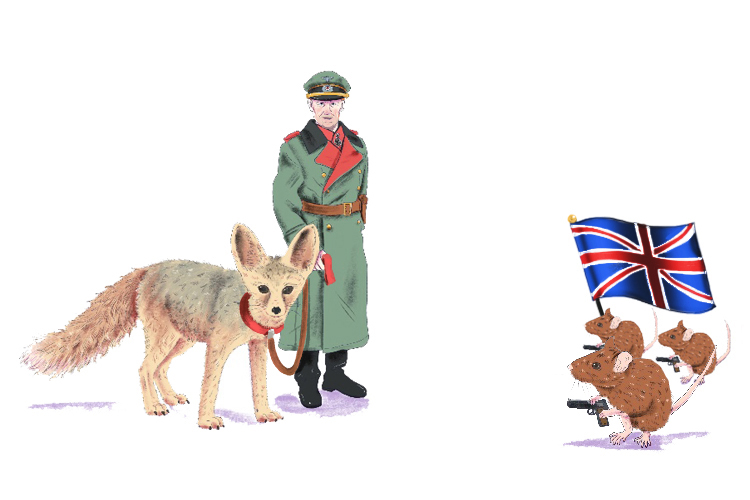Erwin Rommel – Commander of German troops in North Africa
(Pronounced er-vin rom-el – Germans pronounce w's like v's in English)
Known as the Desert Fox, Field Marshall Rommel was best known for his World War II North Africa campaign – he was legendary as a master of mobile operations. The British troops who fought him were known as the Desert Rats. People had high praise for Erwin Rommel but he eventually lost North Africa.

Err! He didn't win (Erwin). This is what happened to the Desert Fox as he romped all (Rommel) around North Africa against the Desert Rats (British).
At the start of World War II, Erwin Rommel, who was then a Major General, was appointed commander of the troops guarding the Führer's headquarters and became personally known to Hitler.
His opportunity to prove himself as a commander came in early 1940 when he took command of the 7th Panzer (tank) Division. He very quickly realised the huge potential of mechanised and armoured troops in an offensive. His first success was a raid on the Channel coast of France in May 1940, in which he demonstrated boldness and initiative.
About a year later, Rommel was appointed commander of German troops sent to help the almost-defeated Italian army in Libya, North Africa.
It was with the German Afrika Korps, in the deserts of North Africa, that Rommel had his greatest successes – and eventually his defeat. He became known as the Desert Fox because of his audacious surprise attacks. Soon, Hitler promoted him to Field Marshall.
He became very popular in the Arab world where he was regarded as a "liberator" from British rule. The German propaganda ministry portrayed him as the invincible "people's marshal".
In the summer of 1942, Hitler ordered an attack on Cairo and the Suez Canal. Rommel and his German-Italian army were stopped by the British at El-Alamein, about 60 miles from Alexandria. The Egypt offensive had overtaxed Rommel's resources and his troops were exhausted.
In October 1942 he was defeated in the Second Battle of El-Alamein and had to withdraw to Tunisia. In March 1943, Hitler ordered Rommel back to Germany.
In 1944, Rommel was given the responsibility of defending France's Channel coast against a possible Allied invasion. However, there was disagreement between Rommel and his superiors over the best way to do this. The disharmony weakened the effectiveness of the Greman defence when the Allied invasion finally came.
After D-Day, Rommel tried to persuade Hitler that the war was lost and he should try to come to terms with the Allies.
During the invasion battle, Rommel's car was attacked by British planes and force off the road. He suffered serious injuries and needed a long period of recovery. Meanwhile, following a failed assassination attempt on Hitler, Rommel's contacts with conspirators came to light. Hitler sent two generals to Rommel, offering him a fatal dose of poison with the promise that his name, and that of his family, would remain unstained if he avoided a trial.
On October 14 1944, aged 52, Rommel took the poison. He was buried with full military honours.
Interesting fact: Rommel did not agree with summary execution or murder for political ends: he invariably disregarded any execution orders given to him by Hitler.




